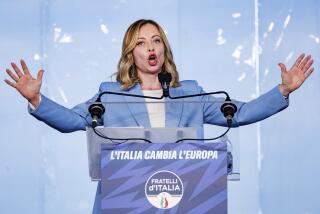Control of IMF is at a crossroads
- Share via
With Dominique Strauss-Kahn out as chief of the International Monetary Fund, some emerging economies are pushing to loosen the six-decade-long stranglehold that Europe has had on a key organization that works to secure global financial stability.
For now, the favorite to replace Strauss-Kahn, who resigned just hours before he was indicted on attempted rape and other charges, appears to be a fellow French citizen whose credentials and political acumen are held in high regard by many in the international finance community.
And that candidate brings a different dimension: If selected, Christine Lagarde, France’s current finance minister, would be the first woman to head the IMF.
Even so, it is by no means a slam dunk that Lagarde or another European would take the helm of the fund, so Strauss-Kahn’s abrupt departure sets the stage for what may be the most widely open selection process for managing director since the organization was formed in 1945.
“The IMF is at a crossroads, it needs to transform,” said Jacob Kirkegaard, a Europe specialist at the Peterson Institute for International Economics, a Washington think tank.
“This opens up a number of politically tricky questions” for the Obama administration and other parties, Kirkegaard said, noting that the fund may face heightened pressure to install an Asian or Latin American managing director — pressure that may spread to the World Bank as well.
Historically, the IMF was headed by a European, and another post-World War II global institution, the World Bank, was steered by an American. But in more recent years, and particularly in the wake of the global financial crisis, rapidly rising countries such as China, India and Brazil have sought a greater voice in international settings in which leadership and policies have long been dominated by the West.
Reflecting that sentiment, the governor of China’s central bank, Zhou Xiaochuan, said the IMF’s top management should better represent emerging markets, even as he called for a transparent and merit-based selection.
Over the years China has been at odds with the IMF over currency and trade policies, though analysts said Strauss-Kahn, in his 3½ years as head, tried to smooth relations with China and leaders of other emerging countries.
The fund recently took steps to give emerging nations more influence by enhancing their voting rights to reflect their increasingly greater share of the global economy.
The IMF, a group of 187 countries, works to foster global monetary cooperation, secure financial stability and facilitate international trade. It also lends to member countries in trouble.
Europe controls 35.6% of the voting shares at the institution and the U.S., 16.8%, so if those two parties see eye to eye on any candidate, they would have the simple majority needed to appoint a managing director.
Treasury Secretary Timothy F. Geithner said Thursday that “we want to see an open process that leads to a prompt succession.”
John Lipsky, who as the IMF’s No. 2 was named acting director after Strauss-Kahn’s arrest last weekend, said the fund’s board would move quickly to lay out the selection process for a new chief. Lipsky has said he would step down as first deputy managing director by the end of August.
The leadership challenge at the IMF comes after the fund’s stature grew during the financial crisis under the stewardship of Strauss-Kahn. His personal problems notwithstanding, Strauss-Kahn led the IMF’s response to the crisis, and the fund has become a kind of secretariat-general to the Group of 20 nations, the preeminent body for global economic issues.
At the same time, Yale economist Stephen Roach noted, the IMF and other global bodies failed to see the financial crisis coming. He said the IMF should not chose the next director based on any notion of entitlement for any region or reward for fast growth, just as tradition shouldn’t dictate a European successor.
“I think the acid test is the potential leader’s vision of the future of the global economy and global finance system,” Roach said.
Roach and others who know Lagarde, the French finance minister, said she was smart and well connected in Europe and Washington.
Europeans may argue it’s important to appoint one of their own as managing director, given Europe’s lingering debt problems and the high-stakes role that the IMF has taken in engineering loan plans to rescue Greece and some other countries.
But it wasn’t clear whether any of the emerging countries had put forward any potential candidate.
Analysts said the IMF has capable people internally, such as Min Zhu of China, who was appointed as special advisor to the managing director a year ago. But they said it may be some time before those executives are ready to assume the high-profile leadership role.
What’s more, as much as some officials may want to place a representative from their country or region at the top, “most challenging would be finding a candidate that even emerging economies could agree on,” said Dali Yang, a political science professor and China scholar at the University of Chicago.
“I think the conversation is moving toward: ‘Maybe it’s time to think beyond Europe and America in terms of the leadership,’” Yang said. “But whether we could break out of that mode [soon] is premature to say.”
More to Read
Inside the business of entertainment
The Wide Shot brings you news, analysis and insights on everything from streaming wars to production — and what it all means for the future.
You may occasionally receive promotional content from the Los Angeles Times.











